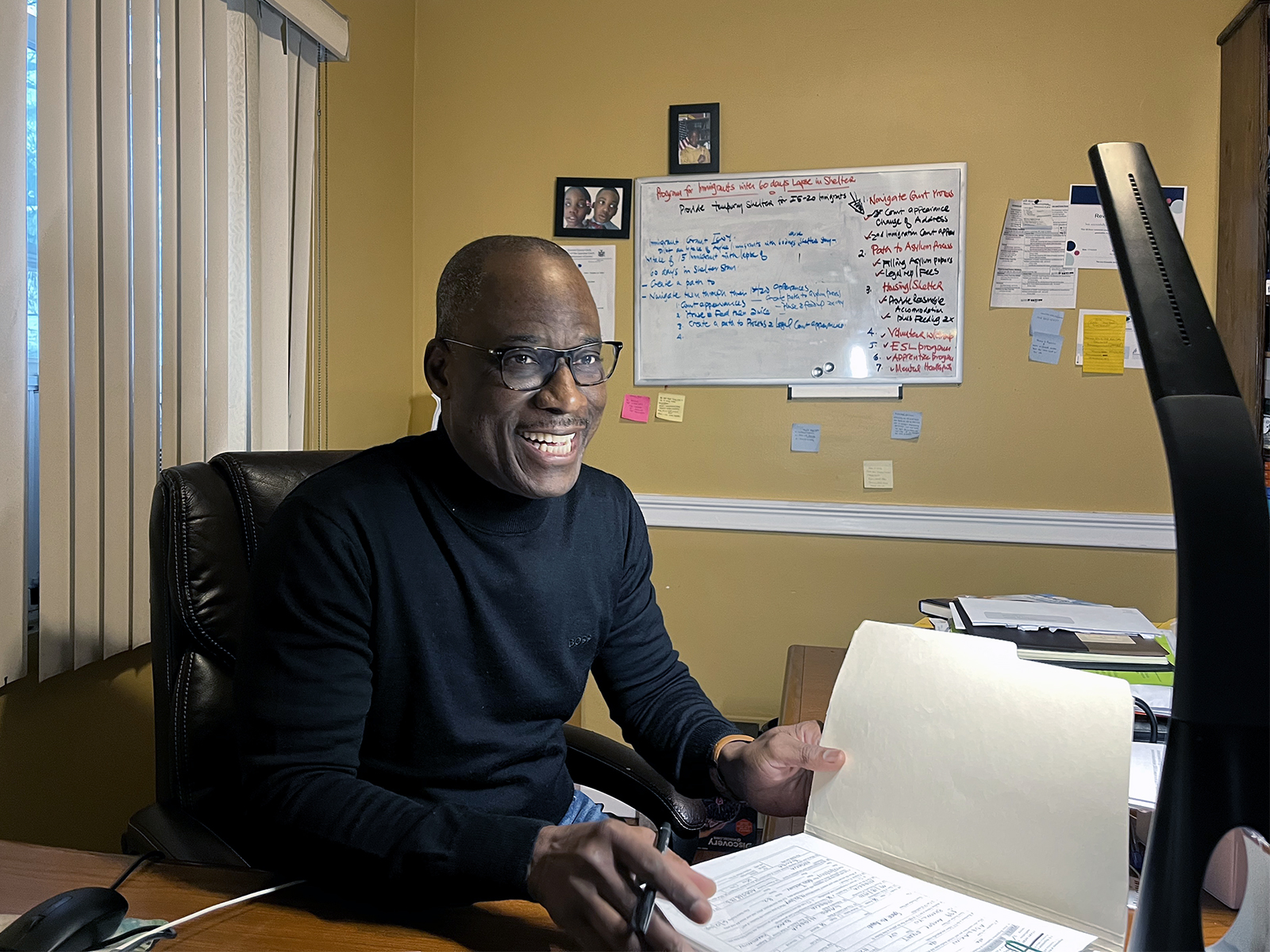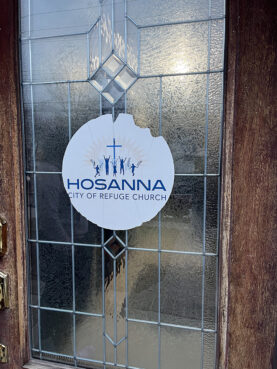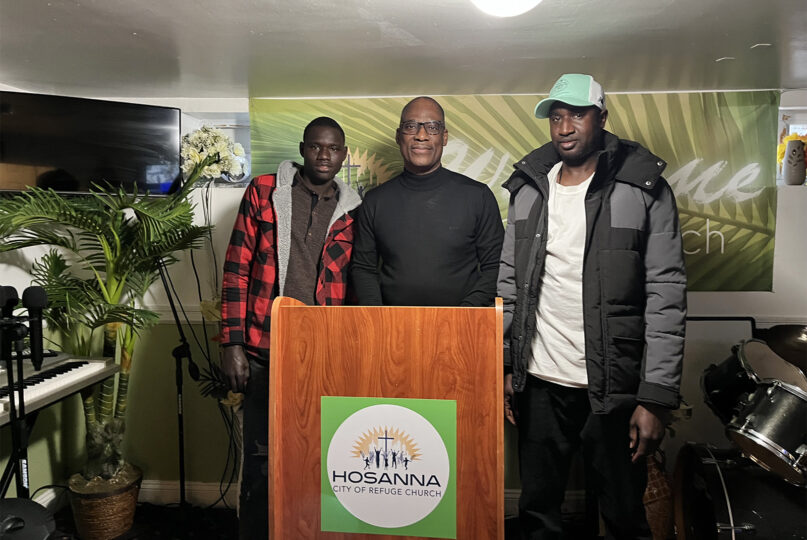NEW YORK (RNS) — Five times a day, the sanctuary of Hosanna City of Refuge Church in Queens, New York, turns into a space for Islamic prayer.
This small house church has welcomed more than 150 migrants since 2007. Given the growing number of them who are Muslim migrants from West Africa, the church’s pastor, the Rev. Phillip Falayi, has invited them to perform their five daily prayers in the church’s sanctuary — which is also his basement.
For the pastor, catering to the migrants’ physical and spiritual needs is equally important.
“They are Muslim. Our intention is to assist them, not convert them. Just because I’m a pastor and you live in my house doesn’t mean you have to do what I’m doing in terms of faith,” he said.
This Pentecostal congregation of 30 people, Nigeria Americans for the most part, gathers for services in the basement of Falayi’s house twice per week, on Sunday and on Tuesday for Bible study. At night, the basement houses up to 20 people, who usually stay in the church’s shelter for two months.
As New York’s migrant crisis has worsened — in 18 months, 140,000 migrants have arrived in the city — the church has partnered with some of the city’s overloaded shelters to take in the people the shelters can no longer house.
Falayi, a Nigerian immigrant and the son of ministers who regularly housed people in need, believes his church’s calling is to serve migrants and unhoused people in New York.
“How can you prepare people for the kingdom of God when they are hungry? Can you preach to people when they have no place to live? I thought about that, and started looking at it from that end,” he said.

The Rev. Phillip Falayi looks for a particular asylum application at his home, which is also the location of Hosanna City of Refuge Church in Queens, New York. (RNS photo/Fiona André)
Every day, the house where Falayi lives with his wife and three kids is full of people. The living room, where the family shares meals with the residents, is filled with boxes of paperwork — asylum applications and immigration services letters — piled up. Since most migrants need a fixed address to communicate with immigration services, the church now receives mail for hundreds of residents and former residents.
Cheikh Dramé, who is 34, was sent from Brooklyn’s Hall Street shelter to Hosanna City of Refuge Church. The shelter, which opened in July, is supposed to be the largest in the city’s history. Still, it can only welcome migrants briefly and is on a constant rotation to accommodate the need.
He has spent a month in the church’s shelter and occasionally leads the Friday prayer with the other Muslim residents. Dramé, who fled his hometown of Dakar, Senegal, because of religious persecution, said the efforts made by the church to accommodate Muslim residents are admirable.

A worn sticker at Hosanna City of Refuge Church in Queens, New York. (RNS photo/Fiona André)
“They are Christian, but still, they are lending us this space for our prayer. That’s good of them,” he said.
Sometimes, Falayi invites Imam Cheikh Tirana Ndao of the Daru Salam Islamic community and Imam Omar Niass from the Ansaru-Deen Islamic mosque to conduct the Friday prayer service in the church. The two faith leaders have been working similarly with migrants in their mosques. Together, the church and the mosques have organized events to offer legal advice to asylum-seekers.
When they arrived at the church, every resident received a kit with essential hygiene products and a new set of clothes. Falayi also takes them to get a haircut from a nearby salon that agreed to give discount prices to the church.
After offering essential care, the pastor looks at every migrant’s immigration status, case by case, evaluating each situation, judging who could file for asylum. Over the years, he has learned to craft compelling asylum applications and understand the complex jargon of immigration law.
“I read up on it and made some calls to a few friends to make sure I was doing the right thing. And now I can do it,” he said while going through a box full of past applications he filed.
It’s crucial, said the pastor, to listen to people’s stories. A lot of residents come from tragic situations and have been traumatized by the long and arduous journey to America, he explained. Falayi said the church wants to care for their bodies and minds and counsel them appropriately.
“I make sure their head is right, their heart is right. Because if you hear their stories, they’ve been through a lot,” said Falayi, who recently took a mental health course to address the residents’ traumas better.
Most migrants come from Francophone West African countries or from Venezuela, explained the pastor. He communicates with them through the help of Google Translate.
Recently, Falayi created a seven-step program to help residents have a successful integration, which includes English classes. Before they leave the shelter, the pastor also looks over apprenticeship possibilities with the residents.
The shelter solely runs on donations and Falayi’s funds. Members of the church and neighbors regularly come by to donate clothes and hygiene products, he said.
In June, Mayor Eric Adams announced a new collaboration with houses of worship to accommodate 1,000 more migrants. The program enables the houses of worship to receive funds to cover expenses to welcome migrants overnight. The Hosanna City of Refuge doesn’t qualify for the program because the basement does not have a sprinkler system, said Falayi.
Still, the church won’t give up on its mission, he said.
“You see this door. It is never locked. It’s always open to everyone,” he said while pointing at the glass front door, adorned with a Hosanna City of Refuge Church sticker.





